THE SOCIETY OF ST. PIUS X IN GABON
Tell us about the beginnings of Tradition in Gabon.
Fr. Groche: Gabon is half the size of France: 85% forest and one million inhabitants. I visited Gabon for the first time in 1983, when I also met Bishop Ndong for the first time. He is the first Gabonese Bishop who was consecrated by Archbishop Lefebvre. I asked Bishop Ndong why he had asked Archbishop Lefebvre to consecrate him as a Bishop. He answered: "Because I have always seen in Archbishop Lefebvre the model priest." So in 1985 after the first trip I had made, I asked Archbishop Lefebvre to come to West Africa and especially to Gabon. In January 1985 we made the trip arriving on the January 15, 1985, on the eve of the Feast of St. Marcel. The next day we went to the Bishop's house to see Bishop Ndong. He was retired, and was living at the Bishop's House of Libreville, and was very happy to see Archbishop Lefebvre. He gave him lodging at the his house and even made him preside at the table, saying to him: "Please sit here, Archbishop Lefebvre. It's the Pope's seat!"
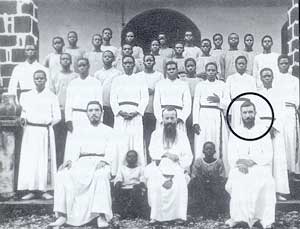 |
|
|
Fr. Marcel Lefebvre (bottom row, far right)
with priests and seminarians at the seminary in Libreville, Gabon, where he was a professor. |
We also went to one of the Missions in Donguila where Archbishop Lefebvre himself had worked for two years. There, with the help of one of his old faithful, who later became Minister of Justice and also Ambassador in Korea, Mr. Valentin Obame, a Mass was organized, and we had at least 40 people. They sang the Mass of the Epiphany just like that, with no preparation. Just 15 minutes before the Mass they asked the Archbishop: "Which Mass would you like to sing?" And they sang practically by heart the Mass of the Epiphany. Amazing! Most of them knew it by heart. That played a large part in the Archbishop's decision to open this mission.
Bishop Ndong organized an interview with the President, who warmly received Archbishop Lefebvre, and spoke with him on the history of all the Lefebvres in Gabon. Archbishop Lefebvre was a missionary priest there for 13 years together with his elder brother, Fr. Rene Lefebvre who remained 40 years in Gabon. He did much work, built schools for the boys and the girls, built houses for the religious sisters, as well as for the laity. He did much for the development of sports, especially football, to the point that the first stadium of Libreville was called the "Stadium of the Reverend Fr. Lefebvre."
It was at this time that Bishop Ndong asked Archbishop Lefebvre: "Send us priests, we need holy priests. Here in Gabon, there aren't any." When Archbishop Lefebvre returned home it was decided that I would come to open the house in Libreville in January 1986. I arrived again in time for the Feast of St. Marcel, January 14, 1986. At first, I stayed at the hotel. The parents of Fr. Selegny, our Secretary General, lived in the area, so, while they were down South, I was able to stay in their house. Now I had to look for a house. Divine Providence guided us to the house where we now are. Once I had the house, the then deacon, now Fr. Carl Stehlin, joined me and we started the St. Pius X Mission. After the June ordinations another priest joined us. We are now four priests at the mission, two brothers and five religious sisters. And at the school there are another three priests.
In the beginning, how many faithful did you have?
At the first Mass that I celebrated in Libreville in 1986 there were four people, of whom three were white! But little by little it became known that we were there, at least through the owner of the house and also through Bishop Ndong, who, when he received visitors, would tell them about us. Then the faithful started coming quite quickly.
You've been there now for 18 years. What has been the growth rate?
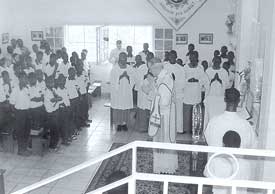 |
|
|
Bishop Richard Williamson celebrates Mass
for the school children |
There was at first a constant growth. At the present moment there's no growth, probably due to lack of space. In 1990, when we enlarged the church, we had about 400 people at Mass. Our old chapel could only accommodate 300 people. So many were outside. After we enlarged the church, in about a month it was already full. In that chapel there were about 700 places. We bought adjoining properties, and were able to enlarge still more and now we have a church with about 1000 seated places. On Sundays, we now have between 1500 and 2000 people. And for the big feasts, like Christmas, Easter...well...for Midnight Mass we had easily 1700 people. We take all the benches from the catechism classes and place them around the Church, because it was built in such a way that one can accommodate almost as many people outside as inside. As we can no longer enlarge inside, we enlarge outside!
Do you have many converts? Marriages? Baptisms?
Well, first the old people arrived with the other faith, and with them arrived the children and the grandchildren. So they of course did not know all this, but the Mass, the liturgy, the singing they liked a lot. Many arrived that were not baptized, so after catechism, they received baptism. I think that up to now we have had more than 4000 baptisms, children and adults. At present we have about 740 people enrolled for catechism of whom 180 are adults.
And they're not baptized yet?
Some of them are not baptized, others are preparing themselves for the sacraments, either first holy Communion or confirmation, or they're at catechism because they want to learn catechism, because they don't know much. And we also prepare them for marriage. It's marriages which we have the least, because of the difficulties we have with the Africans, which you know about, often due to their customs.... Often the traditional custom of marriage imposes a dowry which is beyond the means of many, which often amounts to several million CFA francs. This is what delays the marriages, what complicates things. And there's also the primary problem that the men, well, they like polygamy. And the State recognizes polygamy with up to four wives. So this does not make things any easier.
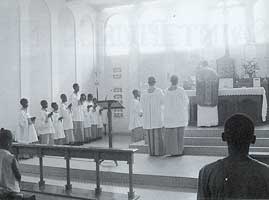 |
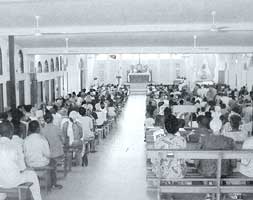 |
|
|
Mass in the church of the Immaculate Heart of Mary |
||
Do you have many confessions?
Well, of course, all those that can confess do confess. So in that area there's been a definite progression since the beginning, especially with so many young people. And then there are all those that have regularized their situations, that's about 100 people now. Not enormous, of course, but if we had not been there I do not know whether they would have thought of regularizing their situations.
We hear confessions every day, every evening. That's when we have Mass for the faithful because they can get there more easily at that time, at 6:30pm. We hear confessions most evenings so it amounts to about five or six hours of confessions per week. It's not a lot, really. But on Sundays we hear more confessions, almost the whole morning, and there are two or three of us. It works out to about three hours per priest in the morning and half an hour in the evening, so that's nine and a half hours. But out of 2000 people nine hours is not so much. But they confess quite regularly.
We also have retreats during the holidays. Always Ignatian retreats. This year we will give two retreats but last year, in other words, every second year, we preached five retreats. Last year we had for the five retreats 105 of our faithful. And it always produces good fruits. Sooner or later. And there are people who come and then regularize their lives. It doesn't happen in week or two, but...
Do the Gabonese prefer Gregorian more than the Tam-Tam?
Yes. The people do not like the tam-tam at the church. That's for the village, for parties. While at church they want religious singing, and there's nothing better than Gregorian. Polyphony also. The priests looks after the two choirs: the Gregorian choir (St. Cecilia) and the polyphonic choir (St. Gregory).
Do people sing during the Mass also?
Yes, everyone sings. In Gregorian. On great feast days, like the Ascension, Easter, Christmas, Epiphany, they sing by heart. It's very impressive. For example, after the Midnight Mass, at the prayers at the foot of the altar and you hear the Dixit Dominus-it's impressive! Then there's the Kyrie, and at the Offertory we always sing a canticle, as well as after the Consecration and during Communion. It lasts a while. For them, to sing is to pray twice. One feels that it is really with their hearts not just with their mouths.
Do you have any vocations from Gabon?
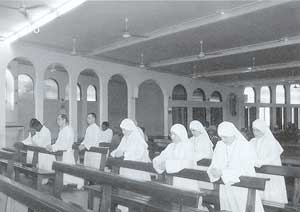 |
|
|
The priests, brothers, and sisters of the community
at prayer. |
Yes, we have at present two Gabonese priests. We also have one seminarian in Ecône, another in Flavigny, and another young man who is soon entering the Benedictines of Bellaigue. We also have three postulants at the Mission. There are sisters also. We have two professed sisters of the Sisters of the Society and another who has just taken the habit, who has been a novice since Low Sunday, and another who is a novice with the Sisters of St. John the Baptist, Le Rafflay, close to Nantes, in France. And we have one that is preparing herself at the Mission. There are others, but they are still at school.
Do you have to help out everywhere with the sacrament of Extreme Unction?
Yes, often. Firstly, we take Communion to homes, to about 60 people over a period of two weeks. It may have diminished now as we had a few deaths, but it's between 50 to 60. We get called by day and by night. The people come, even those that are not of our faithful, because they know if they ring at our doorbell we will answer, and we will go, by day or by night. Whereas in the other parishes there's no petrol to put in the car, there's no money to buy petrol or they don't want to go. And the people know we will go because they talk amongst themselves.
How do you make these trips?
Always by car. There are practically no more horses. The roads are also not good, they are often very damaged. We have a parish 95 miles away, called Four Blasse, which we go to every Sunday. There we have between 70 and 100 people. It is a village of 700 inhabitants. They are planters and they have plantations up to 20 miles away. Some of them walk up to 10, even 12 miles to come to Mass on Sunday. The people themselves are without cars. They are a fairly poor people, and they don't always have the means. They often have many children, if not their own, those of the family.
Tell us a little about the school.
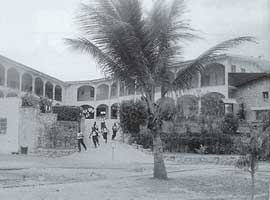 |
|
|
Sacred Heart Academy which has 200 students
|
Well, we started this school, only for the boys, eight years ago. We started with the lowest grade for the little ones, and each year we opened a new grade. Today we are up to the 8th Grade. Next year we will open 9th Grade. In the first year we started with 8 pupils and now we have 170 pupils. We started at the Mission, in the boys' catechism class because as we have 700 people for catechism we had to build catechism classrooms. So the girls are in the catechism classrooms under the Church. Then we bought another property. The Mission is situated on a dead-end, so that we were able to buy various properties along the dead-end. So we bought and renovated a house and there we also have four catechism classrooms for the boys. The girls and the boys are well separated.
The Sisters look after the girls and the Fathers look after the boys. So the school began in the boys' house. But at the end of the third year we had to find something else. They were becoming too numerous and there weren't facilities for the children to have fun, for break periods, and so on. And that's when during a novena to the Infant Jesus of Prague we found this property, which was for sale, the residence of the Ambassador of the United States. We were able to buy it for a good price, despite everything. The Americans made a gesture of good faith towards us because it was for a school.
Are there any plans to start a girls' school?
Well, we'd like to start a school for the girls, but I don't want to start with a primary school if I can't follow it up with the high school. I've already asked for help from the Dominican Sisters in France, but until they tell me: "We are coming soon," or even in three years, I'm not starting, because I don't want to start and then have to let them go.
I remember reading in Archbishop Lefebvre's book that several missionaries died from illness in Gabon. Do the priests still suffer from illnesses?
At that time, when he was a missionary, there was no electricity, there were no facilities. Next to him we are missionaries living in luxury! Electricity, fridges, air-conditioning, all these things, of course, contribute to a better health. So, yes, from time to time some of our colleagues suffer from a bit of fever or malaria, but it's quite rare. Personally, in the past 18 years, I've never had malaria or anything like that. The climate is very difficult. Archbishop Lefebvre used to say that in Gabon you need twice as much determination to do half as much work because of the climate.
How did the modern clergy react to you?
Straight away, the clergy did not agree. The Archbishop of the diocese was very unhappy with us. He tried to get help from the President, but the President had given his agreement to Archbishop Lefebvre when he saw him in 1985, and again in 1986 with Bishop Ndong and myself. So it was hard for him to say no when he had said yes to Archbishop Lefebvre already in the presence Bishop Ndong, (who died in 1989 on the eve of Archbishop Lefebvre's 60 years of priesthood), with whom he was on good terms.
To come back to the modern clergy, they, of course, always spoke against us in sermons, saying: "They are this and they are that..." in such a way that everyone found out that we were there! It's good advertisement! Many of these modern priests are not credible because of their lives. Many of them, and even some of the Holy Ghost Fathers, were not always exemplary. All their innovations, the fact that they dressed like the laity, without any distinct sign that they were priests, resulted in the fact that they didn't have much authority with the Gabonese. So the people came to see us. And that's how little by little we filled up the Church. People rediscovered Gregorian chants, they rediscovered order, priests in cassocks, people who welcomed them and loved them. Even amongst the authorities, they said to themselves: "We must go and see, because it's becoming unbearable here (in the modern Church)."
Does it appear the modernist clergy is disappearing because of its modernism.
It's difficult to say because the average African man is quite religious. Of course, if he has enough knowledge, he won't go just anywhere. But because of his religious spirit, if he is not satisfied somewhere he goes somewhere else. And the fundamentalist churches do a lot of damage. And because the modern Church does not give spiritual and intellectual matter to defend oneself, many of them go into these fundamentalist, Protestant churches. The Catholic churches are nonetheless still very full. According to our faithful there are fewer people in the churches than previously. There are more people today in Libreville, there are more churches, but there are proportionally fewer people in them. If, in Libreville, permission was granted to all the priests to celebrate the old Mass, I think everyone would be happy.
Are there modern priests who desire to say the old Mass?
The modern priests, yes, but not the Holy Ghost Fathers. They are too bad. So, it's the diocesan priests, the African priests. I don't know them very well, but I think that among the younger ones, there are quite a few. In February we had the visit of the seminarians of Libreville, the final three years, so that's the theological part. They came to visit our Mission, about ten of them with their teacher. They came in cassocks-disguised for the occasion! They came to see what a traditional Church is. I wasn't there but they visited everything and were interested and surprised to see in the sacristy the names of Pope John Paul II and the Bishop, because they've heard so much against us. Some of them had already come to our Mass in secret. So there is a work being done. And we also have the advantage that three, four, or five times a year the television station comes to record our Mass and then they show it on a Sunday. We are part of a circuit that shows Mass on Sundays on TV.
Through Your Initiative or Theirs?
Theirs, but there are some of our faithful who work at the television. Even the Director General was one of our faithful. But before he came to us, and even now that he's no longer there, it's still being done. Usually it's on Sundays. So we've already had Pentecost, the Christmas Mass, Easter, Fr. Medard's first Mass, Fr. Pierre Celestin's first Mass, with the Bishops, for the Confirmations. Sometimes it even shows two Sundays in a row. So, of course, it does a great deal of good in the whole country. St. Pius X is known throughout Gabon. It's an apostolate. The Bishops are not very happy.
Are there many Muslims in Gabon?
There are, but they are foreigners. Unfortunately, in Gabon there are many foreigners. The government realized a few years ago that in Libreville, with a population of 450 000, about half are foreigners. They come from West Africa and most are Muslims. The Gabonese love doing administrative work but not other jobs! The President himself is a Muslim, and each year at Christmas, and also at Easter, he sends us his wishes, with flowers. We aren't the only ones but we're on the list.
Are You Visiting Other Groups?
We visit groups in the area of Lambarene and Oyem. Lambarene is a former mission of Archbishop Lefebvre in Gabon, and Oyem is in the north of Gabon. Bishop Ndongo was first Bishop of Oyem. We also go to Cameroon where we have two groups of people: one in Douala and one in Yaounde, the capital. They are bilingual French-English. Also, Nigeria and Cameroon. In Nigeria, in the former Biafra region in the south east, we have a group of about 40 people. Also in Senegal, although we have nothing established as yet, there are people to whom we go.
What Is The Future Of The Society's Work In Gabon?
Well, to continue to develop our school, of course. We've started a first stage of enlargement for the priests' accommodation, in view of the future. Also, the accommodation for the religious sisters. Normally, we should be building another section with about ten classrooms for the secondary school, with a refectory and an adjoining kitchen. And we also want to extend the chapel because it's already too small and people have to stand outside. Otherwise, our future is rather to open something in Nigeria and in Cameroon. Of course, if we had more priests we could open other things. Benin is asking for us, so is Togo, so is Ivory Coast as well as Senegal. Everyone's calling upon us for help.
Fr. Patrick Groche was ordained for the Society of Saint Pius X in 1976. He has been District Superior of Gabon since 1983. He was interviewed by Fr. Coenraad Daniels of the Society of Saint Pius X.
